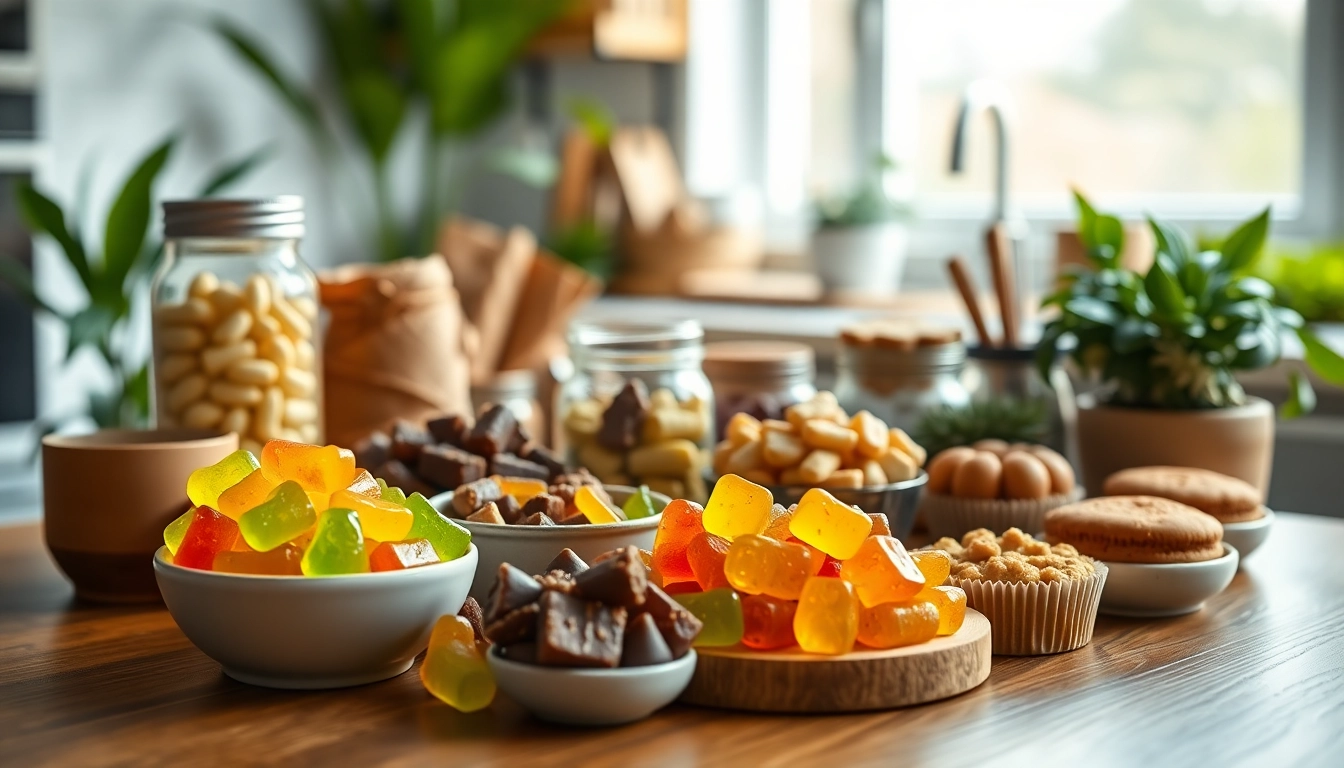Understanding Wholesale CBD Edibles
What are Wholesale CBD Edibles?
Wholesale CBD edibles refer to a popular product line in the burgeoning hemp-derived CBD market. These edibles come in various forms, including gummies, chocolates, beverages, and snacks, infused with cannabidiol (CBD), a non-psychoactive compound known for its potential health benefits. CBD edibles have gained traction due to their perceived effectiveness in managing anxiety, pain, and other health conditions. By purchasing wholesale cbd edibles, businesses can cater to the growing demand while expanding their product offerings in a compliant and lucrative market.
The Benefits of Wholesale CBD Edibles
Investing in wholesale CBD edibles offers multiple advantages for retailers and distributors. First and foremost, these products make it convenient for consumers to incorporate CBD into their daily routines. Unlike traditional CBD oils or tinctures, edibles are easy to consume and typically come with pre-measured servings, allowing for a consistent experience.
Moreover, wholesale CBD edibles can provide greater profit margins compared to other CBD products. Retailers can benefit from bulk purchasing, reducing costs while maintaining retail prices that attract customers. Additionally, these products may have broader attractiveness due to their taste and versatility, appealing to consumers who may not prefer other forms of CBD.
An increasingly favorable regulatory environment surrounding hemp-derived products further boosts the market, providing businesses with greater confidence in their investments.
Types of Wholesale CBD Edibles Available
The wholesale CBD edibles market offers a wide variety of options to suit diverse consumer preferences. Common types include:
- Gummies: These are by far the most popular form of CBD edibles, available in numerous flavors and strengths.
- Chocolate: CBD-infused chocolate bars and bites combine the pleasure of chocolate with the potential therapeutic effects of CBD.
- Drinks: CBD beverages, including teas, sodas, and energy drinks, are gaining traction due to their refreshing qualities.
- Baked Goods: From brownies to cookies, CBD-infused baked goods are capturing the attention of consumers looking for indulgence.
Selecting the Right Wholesale CBD Edibles for Your Needs
Assessing Quality in Wholesale CBD Edibles
Quality is paramount when selecting wholesale CBD edibles. Consumers are increasingly educated and seek transparency regarding the sourcing and production of CBD products. Businesses should focus on several key factors when assessing quality:
- Source of Hemp: Opt for products derived from organic, non-GMO hemp. This ensures that the raw material is free from harmful pesticides and heavy metals.
- Extraction Method: Look for brands that utilize CO2 extraction, which is considered the gold standard for extracting CBD without chemicals.
- Third-party Testing: Ensure that products have been tested by independent laboratories for potency and purity. Certificates of analysis (COAs) should be readily available.
Understanding Legal Regulations for Wholesale CBD Edibles
Understanding the legal landscape surrounding wholesale CBD edibles is critical for any business. The legality of CBD products varies by region, so it is essential to stay informed about local and federal regulations. Businesses must ensure that their products comply with the Farm Bill of 2018, which allows the legal cultivation and sale of hemp-derived CBD as long as it contains less than 0.3% THC.
Additionally, some states have enacted their specific laws that may impose restrictions on the sale and marketing of CBD edibles, including packaging requirements and health claim regulations. Consulting with a legal expert in hemp law can provide peace of mind and help avoid potential pitfalls.
Evaluating Supplier Credentials for Wholesale CBD Edibles
Selecting a reliable supplier is crucial for maintaining a sustainable retail operation. When evaluating potential suppliers for wholesale CBD edibles, consider the following:
- Reputation: Check online reviews, testimonials, and ratings to gauge the supplier’s reliability and product quality.
- Transparency: A reputable supplier should be open about their sourcing practices, extraction methods, and provide third-party testing reports.
- Product Range: It is beneficial to partner with suppliers offering a diverse range of edibles to meet varying consumer preferences.
Marketing Strategies for Wholesale CBD Edibles
Identifying Your Target Audience for Wholesale CBD Edibles
Successful marketing begins with a deep understanding of your target audience. Identifying key demographics that may be interested in wholesale CBD edibles is essential for creating tailored marketing campaigns. Potential target audiences include health-conscious consumers, athletes, individuals seeking natural remedies for stress or pain, and even pet owners interested in CBD products for their pets.
Incorporating surveys, social media insights, and market research can provide valuable data to refine your target audience and tailor your messaging accordingly.
Crafting Effective Messaging for Wholesale CBD Edibles
The messaging surrounding your wholesale CBD edibles should communicate quality, safety, and the potential benefits to consumers. Focus on educating consumers about the differences between CBD and THC, the effects and benefits of CBD, and how to integrate these products into their daily lives. Storytelling can be a powerful tool; share customer testimonials, case studies, or success stories that highlight the effectiveness of your products.
Clear calls-to-action (CTAs) are essential for guiding potential buyers. Ensure that your messaging encourages them to explore or make a purchase while addressing any potential concerns.
Utilizing Social Media to Promote Wholesale CBD Edibles
Social media platforms offer vast opportunities for promoting wholesale CBD edibles. Engaging with consumers on platforms like Instagram, Facebook, and TikTok can build brand loyalty while enhancing visibility:
- Content Creation: Post visually appealing content showcasing your products, including photos, videos, and customer testimonials.
- Educational Posts: Share information on the benefits of CBD, differentiating your products from competitors while positioning your brand as an authority.
- Promotion and Giveaways: Encourage engagement and attract a broader audience by running contests or giveaways that highlight your products.
Common Challenges in Selling Wholesale CBD Edibles
Navigating Market Competition for Wholesale CBD Edibles
The CBD market is becoming increasingly saturated, meaning businesses need to employ effective strategies to stand out. Companies should focus on unique selling propositions (USPs)—what makes their wholesale CBD edibles different from competitors? This differentiation could be product quality, unique flavors, organic ingredients, or innovative delivery methods.
Additionally, businesses should analyze their competitors’ marketing strategies to identify gaps in the market or potential areas for improvement. Conducting a SWOT analysis can provide insight into the best way to capture market share.
Addressing Consumer Misconceptions about Wholesale CBD Edibles
Consumer misconceptions surrounding CBD can hamper sales and inhibit market growth. Address common myths through targeted educational initiatives, such as blog posts, FAQs, and interactive social media content. Some misconceptions include the belief that CBD is psychoactive (instead of THC), that it is illegal everywhere, or that it can cure major illnesses.
Employing transparent messaging and providing scientific resources or interactions with expert influencers in the field can further educate consumers and build trust.
Managing Inventory for Wholesale CBD Edibles
Inventory management is crucial for businesses selling wholesale CBD edibles. Fluctuations in demand necessitate careful forecasting and stocking strategies. Implementing inventory management software can streamline processes, providing data analytics to help anticipate trends. Businesses should maintain optimal inventory levels to avoid disruptions while ensuring they don’t overstock and incur unnecessary expenses.
Regularly reviewing sales data and consumer feedback can also inform product line adjustments or new offerings, aligning with consumer desires while maintaining efficient inventory practices.
Future Trends in Wholesale CBD Edibles
Innovative Flavors and Ingredients in Wholesale CBD Edibles
As consumers become more adventurous, the demand for innovative flavors and ingredients in wholesale CBD edibles is expected to rise. Companies that explore unique flavor profiles—such as tropical fruits, artisanal spices, and fusion blends—stand to capture the attention of a broader audience. Additionally, incorporating superfoods, adaptogens, or local ingredients can further appeal to health-conscious consumers.
Staying ahead of culinary trends and consumer preferences will be essential for brands looking to maintain relevance and attract new customers.
Consumer Preferences Shaping the Wholesale CBD Edibles Market
Consumer preferences are evolving, leading to demand for products that align with their lifestyles and choices. Considerations such as vegan, gluten-free, or sugar-free options are increasingly important for today’s conscientious consumers. By adapting product offerings to meet these preferences, brands can not only increase sales but also create a loyal customer base that values commitment to health and wellness.
Keeping a pulse on consumer trends through surveys and social media engagement can afford businesses timely insight into emerging preferences in the rapidly changing market.
Sustainability in Production of Wholesale CBD Edibles
Environmental sustainability is becoming a primary concern for consumers across various industries, including CBD. Businesses that adopt eco-friendly practices in sourcing, packaging, and production are likely to generate greater consumer interest and loyalty.
Utilizing recyclable or biodegradable materials for packaging, reducing carbon footprints in production, and emphasizing sustainable farming practices can create a strong brand identity centered on responsibility. Marketing these initiatives can resonate profoundly with eco-conscious consumers, further differentiating your brand in a crowded marketplace.




